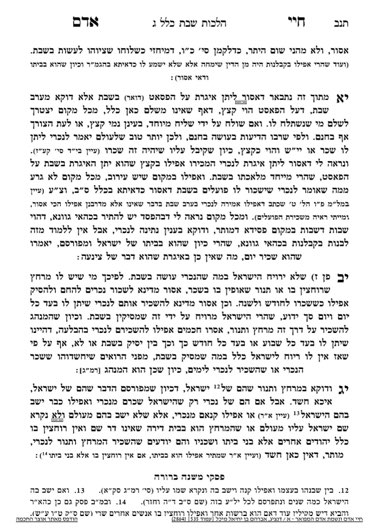We are continuing in siman 12, discussing the seventh criterion for it to be permitted to make an arrangement with a non-Jew before Shabbos regarding melacha on Shabbos. This criterion is that the Jew cannot gain any economic benefit from the work which the non-Jew is doing on Shabbos.
Yesterday, we discussed the example of a Jewish taxi driver who rents out his taxi to a non-Jew for Shabbos. We learned that the correct arrangement would be if the non-Jew rents the taxi for a fixed amount of money, and all profits (or losses) go to the non-Jew, so that the Jew is not directly benefiting from the work done by the non-Jew on Shabbos.
Regarding the concern of maris ayin, if the common arrangement is to give the Jew a fixed fee and for the non-Jew to take all of the profits, there is no issue of maris ayin. Additionally, there cannot be any indication that the car is a Jewish car.
The Shulchan Aruch, in siman 246, discusses renting items to a non-Jew, such as the example we gave of a non-Jew picking up a rental car on Shabbos. The Shulchan Aruch writes that it is muttar on Erev Shabbos, but according to the Rema it must be picked up on Thursday. Both hold that the rental cannot begin on Shabbos itself. The Rema holds that if the non-Jew picks up the item on Erev Shabbos, it appears as though the Jew is instructing the non-Jew to go do work on Shabbos, and it may be mistaken as the non-Jew working for the Jew.
There is another issue which must be clarified, which is sechar Shabbos, making a profit on Shabbos. Although we will discuss this concept in greater detail later, the Chayei Adam touches on it here. The Chayei Adam writes that Chazal prohibit receiving financial benefit for something done on Shabbos, even if there is no melacha involved. For example, a person cannot be paid for babysitting on Shabbos, or for renting out an item to be used over Shabbos. The poskim even grapple with how a person can get paid for laining on Shabbos.
Over here, even if the Jew is renting a car to a non-Jew in a permissible manner, there is still an issue of sechar Shabbos. One of the leniencies is that if the payment is not solely for Shabbos, it is muttar. This is known as havla’ah. Thus, for example, the person laining should prepare the laining before Shabbos, and the item rented should be rented for longer than just Shabbos.
Thus, there are four issues which need to be addressed under this criterion:
- The Jew receives no direct benefit (i.e., money) from the work of the non-Jew;
- There is no issue of maris ayin;
- The Jew avoids sechar Shabbos;
- The Jew is careful that it does not appear that the non-Jew is working for the Jew, which, according to the Rema, means the item needs to be transferred over on Thursday.
- If one instructs a non-Jew before Shabbos, there are times when it will be muttar, depending on eight conditions.
- The seventh condition is that the Jew cannot gain any economic benefit from the non-Jew working on Shabbos. Thus, for example, if the Jew rents something to the non-Jew, the Jew must be paid a flat fee and all profits must go to the non-Jew.
- Additionally, there must be no issues of maris ayin, sechar Shabbos, or the appearance that the non-Jew is working for the Jew.



